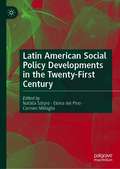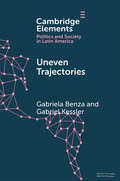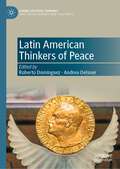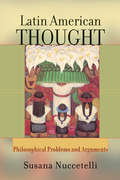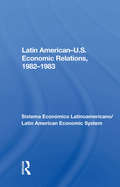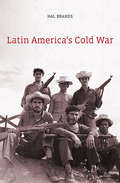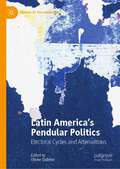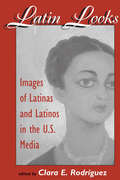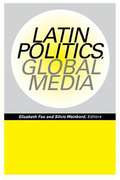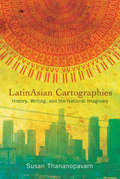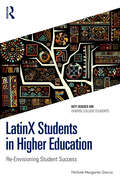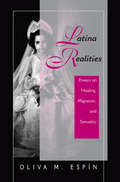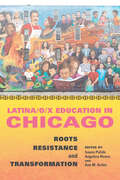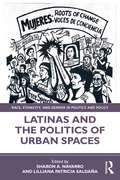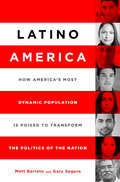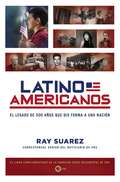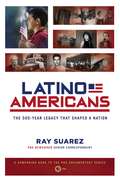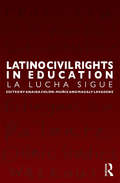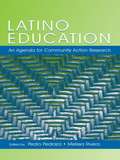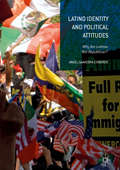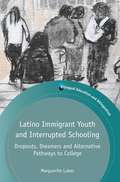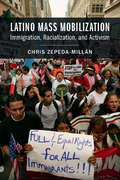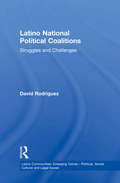- Table View
- List View
Latin American Social Policy Developments in the Twenty-First Century
by Natália Sátyro Eloísa Del Pino Carmen MidagliaThis book explores the scope of reforms and changes in the social protection systems in Latin America that have started at the beginning of the 21st century. It describes how and to what extent changes in social protection systems and social policies have occurred in the region in recent decades. Taking a comparative approach, the volume identifies the triggers for the transformations and how such pressures are received by the welfare regime, or a specific policy sector, to finally yield a given type of reform. The analysis is characterized by the presence of certain factors that explain the development of social protection systems in Latin America, such as economic growth, the consolidation of democratic political regimes, and the region’s Left Turns. The book also examines to what extent common challenges and processes induced by international institutions have led to convergence among countries or welfare regimes, or whether each maintains its own identity.
Latin American Society Today: Latin American Societies In The Twenty-first Century (Elements in Politics and Society in Latin America)
by Gabriela Benza Gabriel KesslerThis Element presents the main characteristics of the current social structure in Latin America. We focus on demographic trends, migration, families, incomes, education, health and housing, and examine the general policy trends for all of these issues. Our main questions are: What is the social structure in Latin America like today? What changes have taken place in recent decades, particularly since the turn of the millennium? We argue that although in some dimensions there are continuities, including the persistence of problems from the past, we believe that the Latin American social structure, viewed as a whole, experienced significant transformations.
Latin American State Building in Comparative Perspective
by Marcus J. KurtzLatin American State Building in Comparative Perspective provides an account of long-run institutional development in Latin America that emphasizes the social and political foundations of state-building processes. The study argues that societal dynamics have path-dependent consequences at two critical points: the initial consolidation of national institutions in the wake of independence, and at the time when the "social question" of mass political incorporation forced its way into the national political agenda across the region during the Great Depression. Dynamics set into motion at these points in time have produced widely varying and stable distributions of state capacity in the region. Marcus J. Kurtz tests this argument using structured comparisons of the post-independence political development of Chile, Peru, Argentina, and Uruguay.
Latin American Thinkers of Peace (Global Political Thinkers)
by Andrea Oelsner Roberto DomínguezThis book analyzes seven Latin American thinkers who have contributed to building bridges for reconciliation and peace: Carlos Saavedra Lamas, Adolfo Pérez Esquivel, Alfonso García Robles, Óscar Arias Sánchez, Rigoberta Menchú Tum, Juan Manuel Santos, and Javier Pérez de Cuéllar. Working within an eclectic conceptual approach to systematize the circulation of ideas embraced by each one of the thinkers, the various contributions delve into the current literature of leadership and intellectuals in Politics and Global International Relations (GIR). Overall, the central premises of the analysis are based on three fundamentals of mainstream constructivism: a) change across time and space in the lifetime of each thinker under analysis in this book; b) socialization through changing norms, rules, and language; and c) processes of interaction in which actors make choices in selecting networks and strategies). Coming from different walks of life, the seven thinkers examined in this book have accessed the global public square and discussed ideas to reduce conflicts at different scales. In their respective historical times, they circulated their views and ideas beyond the confines of Latin America to influence global political thought and produce change in favor of peace.
Latin American Thought: Philosophical Problems And Arguments
by Susana NuccetelliMany of the philosophical questions raised in Latin America may seem to be among the perennial problems that have concerned philosophers at different times and in different places throughout the Western tradition, but they are not altogether the same--for Latin American thinkers have often adapted them to capture problems presented by new circumstances, and sought resolutions with arguments that are indeed novel. This book explains how well-established philosophical traditions gave rise in the New World to a characteristic form of thought not to be found in other cultures. There was no clean sweep of the past and an attempt to start over: rather, Latin American thinkers gradually adapted European ideas to their needs, sometimes borrowing on a larger scale, sometimes less. It is then no surprise that, under Iberian rule, Scholasticism became the accepted view and began to lose its grip only when the rulers did. But what does seem surprising is the radical way in which those traditions were on occasions challenged, as illustrated by the cases of Jos�e Acosta, a Jesuit priest in Peru, and the Mexican nun, Juana In�de la Cruz?each of whom spoke out against certain aspects of the official philosophy in colonial society. And when theories familiar elsewhere arrived to Latin America, as in the cases of positivism and Marxism, they were often seen differently in the light of new circumstances.But above all, this book shows that there is a body of interesting philosophical arguments offered by Latin Americans concerning problems that have arisen in Spanish- and Portuguese-speaking parts of the New World. In connection with this purpose, it examines how Latin Americans have thought about philosophical issues belonging to metaphysics, philosophy of science, cross-cultural psychology, feminist epistemology, ethics, and social and political philosophy. These are taken up in due course, paying special attention to questions of rationality, gender discrimination, justice, human rights, reparation for historically dispossessed native peoples, and relativism vs. universalism--all matters of continuing concern in Latin American thought, from its earliest stirrings to the present day. And among some specific issues that have generated heated controversies from the early twentieth century to the present, the book explores how Latin Americans and their descendants abroad think of their own cultural identity, examines their critique of US mass-culture and moral philosophy, and considers at some length the vexing problem of which name, if any, is the correct one to use to refer to all of this exceedingly diverse ethnic group. A closer look at the defining elements of Latin American identity has often led to questions concerning the characteristic features that might distinguish Latin Americans and their descendants abroad from other peoples of the world, the existence of a typically Latin American philosophy, and the correct name to refer to them. These, often conflated in the literature, are treated separately by the author, who favors a historically-based account of Latin-American identity. She also argues that the existence of a characteristically Latin American philosophy can be shown?though not by appealing to some standard but implausible reasons. And to resolve the question concerning a correct ethnic-group name, she proposes a new approach to the semantics of those names.
Latin American-u.s. Economic Relations, 1982-1983
by Avraham SelaThis book, prepared by the Permanent Secretariat of the Latin American Economic System (SFXA), analyzes a range of factors in the current economic policies of the United States that affect Latin American and Caribbean countries. In particular, it pinpoints the effects of U.S. monetary policy on the region's economies and trade relations and on the
Latin America’s Cold War
by Hal BrandsFor Latin America, the Cold War was anything but cold. Nor was it the so-called “long peace” afforded the world’s superpowers by their nuclear standoff. In this book, the first to take an international perspective on the postwar decades in the region, Hal Brands sets out to explain what exactly happened in Latin America during the Cold War, and why it was so traumatic. Tracing the tumultuous course of regional affairs from the late 1940s through the early 1990s, Latin America’s Cold War delves into the myriad crises and turning points of the period—the Cuban revolution and its aftermath; the recurring cycles of insurgency and counter-insurgency; the emergence of currents like the National Security Doctrine, liberation theology, and dependency theory; the rise and demise of a hemispheric diplomatic challenge to U.S. hegemony in the 1970s; the conflagration that engulfed Central America from the Nicaraguan revolution onward; and the democratic and economic reforms of the 1980s. Most important, the book chronicles these events in a way that is both multinational and multilayered, weaving the experiences of a diverse cast of characters into an understanding of how global, regional, and local influences interacted to shape Cold War crises in Latin America. Ultimately, Brands exposes Latin America’s Cold War as not a single conflict, but rather a series of overlapping political, social, geostrategic, and ideological struggles whose repercussions can be felt to this day.
Latin America’s Pendular Politics: Electoral Cycles and Alternations (Studies of the Americas)
by Olivier DabèneThis book explores pendular politics in Latin America, focusing on electoral cycles with a pattern of similar results. Latin America has been neoliberal in the 1990s, leftist during the 2000s, then conservative in 2016-2018 and progressist again since 2018.The reference to a right/left/right/left sequence over a period of thirty years undoubtedly accounts for a singular pendulum pattern yet proves to be excessively simplistic. The right/left dichotomy hides fractures and nuances that characterize each political camp.This book seeks to explain why some elections result in alternations and others do not. Based on an innovative theoretical framework and a unique collection of case studies, the book offers a rich understanding of Latin America’s contemporary political evolutions.Voters are getting accustomed to punishing incumbents for not delivering in time of crises, resulting in frequent alternations. It might be good for democracy, not so much for governability.
Latin Looks: Images of Latinas and Latinos in the U.S. Media
by Clara E RodriguezWhat are “Latin looks”? A Latin look may seem at first blush to be something that everyone recognizes—brunette, sensual, expressive, animated, perhaps threatening. But upon reflection, we realize that these are the images that are prevalent in the media, while the reality in Latino communities is of a rich diversity of people and images. This book brings together a selection of the best, the most interesting, and the most analytically sophisticated writing on how Latinos have been portrayed in movies, television, and other media since the early years of the twentieth century and how images have changed over time in response to social and political change. Particular emphasis is given to representations of class, gender, color, race, and the political relationship between the United States and Latin America. Together the essays offer a corrective lens for interpreting how images are created, perpetuated, and manipulated.
Latin Politics, Global Media
by Silvio Waisbord Elizabeth FoxThe globalization of media industries that began during the 1980s and 1990s occurred at the same time as the establishment of or return to democratic forms of government in many Latin American countries.<P><P> In this volume of specially commissioned essays, thirteen well-known media experts examine how the intersection of globalization and democratization has transformed media systems and policies throughout Latin America. <P> Following an extensive overview by editors Elizabeth Fox and Silvio Waisbord, the contributors investigate the interaction of local politics and global media in individual Latin American countries. Some of the issues they discuss include the privatization and liberalization of the media, the rise of media conglomerates, the impact of trade agreements on media industries, the role of the state, the mediazation of politics, the state of public television, and the role of domestic and global forces. The contributors address these topics with a variety of theoretical approaches, combining institutional, historical, economic, and legal perspectives.
LatinAsian Cartographies: History, Writing, and the National Imaginary (Latinidad: Transnational Cultures in the United States)
by Susan ThananopavarnLatinAsian Cartographies examines how Latina/o and Asian American writers provide important counter-narratives to the stories of racial encroachment that have come to characterize twenty-first century dominant discourses on race. Susan Thananopavarn contends that the Asian American and Latina/o presence in the United States, although often considered marginal in discourses of American history and nationhood, is in fact crucial to understanding how national identity has been constructed historically and continues to be constructed in the present day. Thananopavarn creates a new “LatinAsian” view of the United States that emphasizes previously suppressed aspects of national history, including imperialism, domestic racism during World War II, Cold War operations in Latin America and Asia, and the politics of borders in an age of globalization. LatinAsian Cartographies ultimately reimagines national narratives in a way that transforms dominant ideas of what it means to be American.
LatinX Students in Higher Education: Re-Envisioning Student Success (Key Issues on Diverse College Students)
by Nichole Margarita GarciaThe most recent addition to the “Key Issues on Diverse College Students” series, this important volume bridges theory to practice in order to help higher education professionals support LatinX students in colleges and universities. LatinX Students in Higher Education challenges the traditional metrics of student success in higher education for LatinX students, offering a revised definition of student success to re-envision the skills and abilities that these students bring from their communities into institutions of higher education and community-based settings. Garcia’s powerful counter-story narratives shed light on the urgent need for systemic reform, and ultimately this book challenges institutions to adopt more inclusive and anti-racist practices that honor cultural identity, community, and resilience. This is a must-read for researchers, educators, student affairs professionals, students, and policymakers committed to creating an equitable higher education system and promoting the success of LatinX populations in higher education.
Latina Realities: Essays On Healing, Migration, And Sexuality
by Oliva EspinA retrospective of fifteen years, this book brings together, for the first time, Oliva Espns previously published articles and conference papers. Together, these writings reveal the complexity and encompassing quality of Espns most significant contributions to the contemporary debates within psychology. Topics include sexuality, therapy with Latinas and other women of color, immigrant and refugee women, ethnic minority and immigrant women of diverse sexual orientations, and theoretical perspectives on feminist psychology and diversity. }A retrospective of fifteen years, this book brings together, for the first time, Oliva Espns previously published articles and conference papers. Together, these writings reveal the complexity and encompassing quality of Espns most significant contributions to the contemporary debates within psychology. Topics include sexuality, therapy with Latinas and other women of color, immigrant and refugee women, ethnic minority and immigrant women of diverse sexual orientations, and theoretical perspectives on feminist psychology and diversity. Primarily focusing on the experiences of Latina women, gleaned from psychotherapy practice and research, the book presents discussions on experience as a source of theory and method in psychology; issues relevant to immigrant women and girls, such as sexuality and language; and other similar topics. Latina Realities is bound to be a valuable text for advanced courses exploring diversity in psychology and womens lives as well as a useful supplementary reading for introductory courses in psychology of women, womens studies, cultural psychology, and other gender or ethnic issues courses. }
Latina/o/x Education in Chicago: Roots, Resistance, and Transformation (Latinos in Chicago and Midwest)
by Nilda Flores-González Lilia Fernández Jaime Alanís Ann M Avilés Gabriel Alejandro Cortez Erica R Dávila Cristina Pacione-Zayas Isaura Pulido Angelica Rivera Arlene Torres Mirelsie Velázquez Leticia Villarreal SosaIn this collection, local experts use personal narratives and empirical data to explore the history of Mexican American and Puerto Rican education in the Chicago Public Schools (CPS) system. The essays focus on three themes: the historical context of segregated and inferior schooling for Latina/o/x students; the changing purposes and meanings of education for Latina/o/x students from the 1950s through today; and Latina/o/x resistance to educational reforms grounded in neoliberalism. Contributors look at stories of student strength and resistance, the oppressive systems forced on Mexican American women, the criminalization of Puerto Ricans fighting for liberatory education, and other topics of educational significance. As they show, many harmful past practices remain the norm--or have become worse. Yet Latina/o/x communities and students persistently engage in transformative practices shaping new approaches to education that promise to reverberate not only in the city but nationwide. Insightful and enlightening, Latina/o/x Education in Chicago brings to light the ongoing struggle for educational equity in the Chicago Public Schools.
Latinas and the Politics of Urban Spaces (Race, Ethnicity, and Gender in Politics and Policy)
by Lexi Earl and Pat ThomsonThis book illuminates the ways in which Chicanas, Puerto Rican women, and other Latinas organize and lead social movements, either on the ground or digitally, in major cities of the continental United States and Puerto Rico. It shows how they challenge racism, sexism, homophobia, and anti-immigrant policies through their political praxis and spiritual activism. Drawing from a range of disciplines and perspectives, academic and activist authors offer unique insights into environmental justice, peace and conflict resolution, women’s rights, LGBTQ coalition-building, and more—all through a distinctive Latina lens. Designed for use in a wide range of college courses, this book is also aimed at practitioners, community organizers, and grassroots leaders.
Latino America: How America's Most Dynamic Population is Poised to Transform the Politics of the Nation
by Gary M. Segura Matt BarretoSometime in April 2014, somewhere in a hospital in California, a Latino child tipped the demographic scales as Latinos displaced non-Hispanic whites as the largest racial/ethnic group in the state. So, one-hundred-sixty-six years after the Treaty of Guadalupe Hidalgo brought the Mexican province of Alta California into the United States, Latinos once again became the largest population in the state. Surprised? Texas will make the same transition sometime before 2020. When that happens, America’s two most populous states, carrying the largest number of Electoral College votes, will be Latino. New Mexico is already there. New York, Florida, Arizona, and Nevada are shifting rapidly. Latino populations since 2000 have doubled in Alabama, Arkansas, Georgia, and South Dakota. The US is undergoing a substantial and irreversible shift in its identity. So, too, are the Latinos who make up these populations. Matt Barreto and Gary M. Segura are the country’s preeminent experts in the shape, disposition, and mood of Latino America. They show the extent to which Latinos have already transformed the US politically and socially, and how Latino Americans are the most buoyant and dynamic ethnic and racial group, often in quite counterintuitive ways. Latinos’ optimism, strength of family, belief in the constructive role of government, and resilience have the imminent potential to reshape the political and partisan landscape for a generation and drive the outcome of elections as soon as 2016.
Latino Americanos
by Ray SuarezEL LIBRO COMPLEMENTARIO DE LA CONOCIDA SERIE DOCUMENTAL DE PBS Latino americanos relata la rica y variada historia de los Latinos que han contribuido a darle forma a nuestra nación, y quienes se han convertido --con más de 50 millones de personas-- en la minoría más numerosa de los Estados Unidos. Este complemento de la conocida miniserie de PBS relata, de manera vívida y franca, cómo la historia de los lationamericanos es la historia de nuestro país. El aclamado periodista y autor Ray Suarez explora las vidas de hombres y mujeres latinoamericanos en un periodo de quinientos años, e incluye una gama épica de experiencias que abarca desde los primeros asentamientos europeos al Destino Manifiesto; del Salvaje Oeste a la Guerra Fría; de la Gran Depresión a la globalización; de la Guerra Hispano-Estadounidense al movimiento de los derechos civiles. Latino americanos comparte las luchas personales y los éxitos de inmigrantes, poetas, soldados y muchos otros: individuos que han causado un impacto en la historia y aquellos cuyas extraordinarias vidas iluminan la época en que vivieron, así como el legado de estos sensacionales estadounidenses.
Latino Americans
by Ray SuarezTHE COMPANION BOOK TO THE PBS DOCUMENTARY SERIES Latino Americans chronicles the rich and varied history of Latinos, who have helped shaped our nation and have become, with more than fifty million people, the largest minority in the United States. This companion to the landmark PBS miniseries vividly and candidly tells how the story of Latino Americans is the story of our country. Author and acclaimed journalist Ray Suarez explores the lives of Latino American men and women over a five-hundred-year span, encompassing an epic range of experiences from the early European settlements to Manifest Destiny; the Wild West to the Cold War; the Great Depression to globalization; and the Spanish-American War to the civil rights movement. Latino Americans shares the personal struggles and successes of immigrants, poets, soldiers, and many others-individuals who have made an impact on history, as well as those whose extraordinary lives shed light on the times in which they lived, and the legacy of this incredible American people. .
Latino Civil Rights in Education: La Lucha Sigue (Series in Critical Narrative)
by Anaida Colon-Muniz Magaly LavadenzLatino Civil Rights in Education: La Lucha Sigue documents the experiences of historical and contemporary advocates in the movement for civil rights in education of Latinos in the United States. These critical narratives and counternarratives discuss identity, inequality, desegregation, policy, public school, bilingual education, higher education, family engagement, and more, comprising an ongoing effort to improve the conditions of schooling for Latino children. Featuring the perspectives and research of Latino educators, sociologists, historians, attorneys, and academics whose lives were guided by this movement, the book holds broad applications in the study and continuation of social justice and activism today.
Latino Education: An Agenda for Community Action Research
by Pedro Pedraza Melissa RiveraThis landmark volume represents the work of the National Latino/a Education Research Agenda Project (NLERAP)-an initiative focused on school reform and educational research with and for Latino communities. NLERAP's goal is to bring together various constituencies within the broad Latino community who are concerned with public education to articulate a Latino perspective on research-based school reform, and to use research as a guide to improving the public school systems that serve Latino students and to maximizing their opportunities to participate fully and equally in all social, economic, and political contexts of society. Latino Education: An Agenda for Community Action Research conceptualizes and illustrates the theoretical framework for the NLERAP agenda and its projects. This framework is grounded in three overlapping areas of scholarship and activism, which are reflected within the chapters in this volume: critical studies, illuminating and analyzing the status of people of color in the United States; Latino/a educational research, capturing the sociohistorical, cultural, and political schooling experiences of U.S. Latino/a communities; and participatory action research, exemplifying a liberation-oriented methodology for truly transformative education. The volume includes both descriptive educational research and critical analyses of previous research and educational agendas related to Latino/a communities in the United States. According to current U.S. Census data, Latinos now comprise the largest minority group in the total U.S. population. Historically, reflecting larger sociohistorical and economic inequalities in U.S. society, the Latino community has not been well served by U.S. public school systems. More attention to the Latino students' educational issues is needed to redress this problem, especially given the tremendous population increase and projected growth of Latino communities in the U.S. Latino Education: An Agenda for Community Action Research is a major contribution toward this goal.
Latino Identity and Political Attitudes
by Angel Saavedra CisnerosThis book explores the forces that shape Latino political preferences, arguing that social identities are at the center of Latino partisanship. Despite hopes of the Republican Party for bringing in Latinos through religious and moral issues, Latinos in America consistently side with the Democratic Party. Two possible explanations based on social identity emerge as theories of Latino partisanship. The first possibility is that Latinos behave as a single-issue public driven politically by the issue of immigration. A thorough exploration of this possibility in part two of the book finds very little evidence to justify treating Latinos as a single-issue public. The second explanation, presented in part three, relies more heavily on the concept of social identities. Latino pan-ethnic identity emerges as one of multiple identities available to Latinos in America. These multiple, diverse, and overlapping identities are the force behind Latino partisanship. Latino ethnic identity trumps the impact of religious identities in making Latinos more Democratic.
Latino Identity and Political Attitudes: Why Are Latinos Not Republican?
by Angel Saavedra CisnerosThis book explores the forces that shape Latino political preferences, arguing that social identities are at the center of Latino partisanship. Despite hopes of the Republican Party for bringing in Latinos through religious and moral issues, Latinos in America consistently side with the Democratic Party. Two possible explanations based on social identity emerge as theories of Latino partisanship. The first possibility is that Latinos behave as a single-issue public driven politically by the issue of immigration. A thorough exploration of this possibility in part two of the book finds very little evidence to justify treating Latinos as a single-issue public. The second explanation, presented in part three, relies more heavily on the concept of social identities. Latino pan-ethnic identity emerges as one of multiple identities available to Latinos in America. These multiple, diverse, and overlapping identities are the force behind Latino partisanship. Latino ethnic identity trumps the impact of religious identities in making Latinos more Democratic.
Latino Immigrant Youth and Interrupted Schooling
by Marguerite LukesThis book offers an innovative look at the pre- and post-migration educational experiences of immigrant young adults with a particular focus on members of the Latino community. Combining quantitative data with original interviews, this book provides an engaging and nuanced look at a population that is both ubiquitous and overlooked, challenging existing assumptions about those categorized as 'dropouts' and closely examining the historical contexts for educational interruption in the chosen subgroup. The combination of accessible prose and compelling new statistical data appeals to a wide audience, particularly academic professionals, education practitioners and policy-makers.
Latino Mass Mobilization: Immigration, Racialization, and Activism
by Chris Zepeda-MillánIn the spring of 2006, millions of Latinos across the country participated in the largest civil rights demonstrations in American history. In this timely and highly anticipated book, Chris Zepeda-Mill#65533;n analyzes the background, course, and impacts of this unprecedented wave of protests, highlighting their unique local, national, and demographic dynamics. He finds that because of the particular ways the issue of immigrant illegality was racialized, federally proposed anti-immigrant legislation (H. R. 4437) helped transform Latinos' sense of latent group membership into the racial group consciousness that incited their engagement in large-scale collective action. Zepeda-Mill#65533;n shows how nativist policy threats against disenfranchised undocumented immigrants can provoke a political backlash - on the streets and at the ballot box - from not only 'people without papers', but also naturalized and US-born citizens. Latino Mass Mobilization is an important intervention into contemporary debates regarding immigration policy, social movements, and racial politics in the United States.
Latino National Political Coalitions: Struggles and Challenges (Latino Communities: Emerging Voices - Political, Social, Cultural and Legal Issues)
by David RodriguezThis study examines Latino national political coalitions in the United States with a focus on Chicanos, Puerto Ricans, and Cubans. It argues that Latino national political coalitions are an avenue of political empowerment for the Latino Community, but face social, economic, and political challenges in the Latino community.
